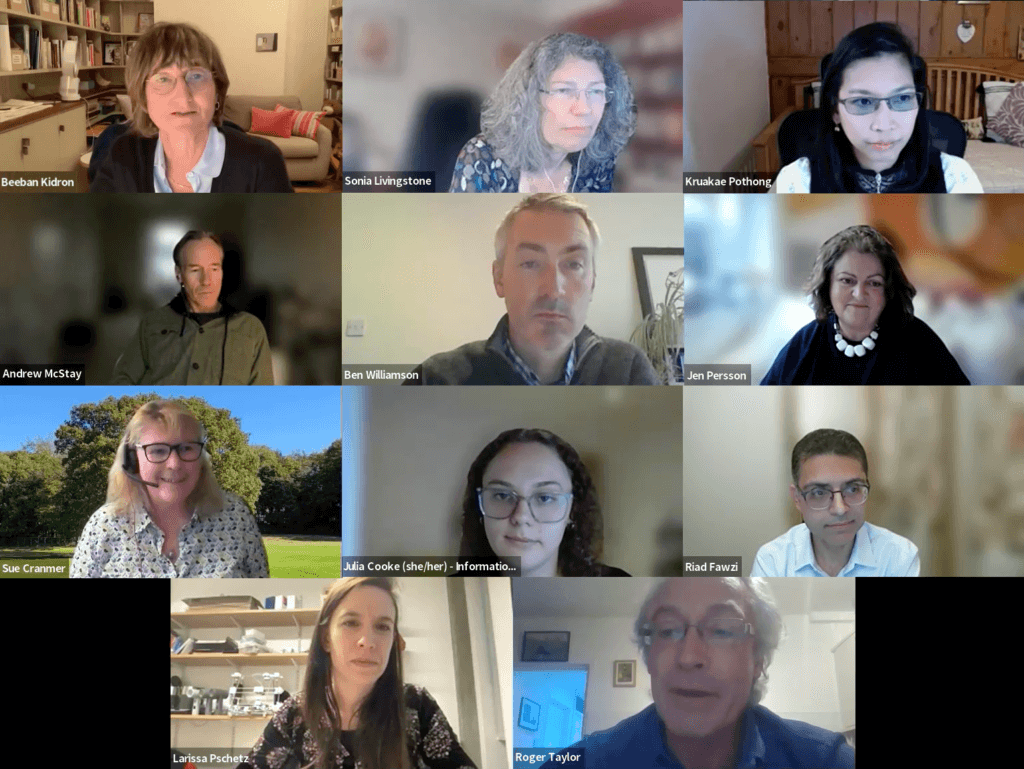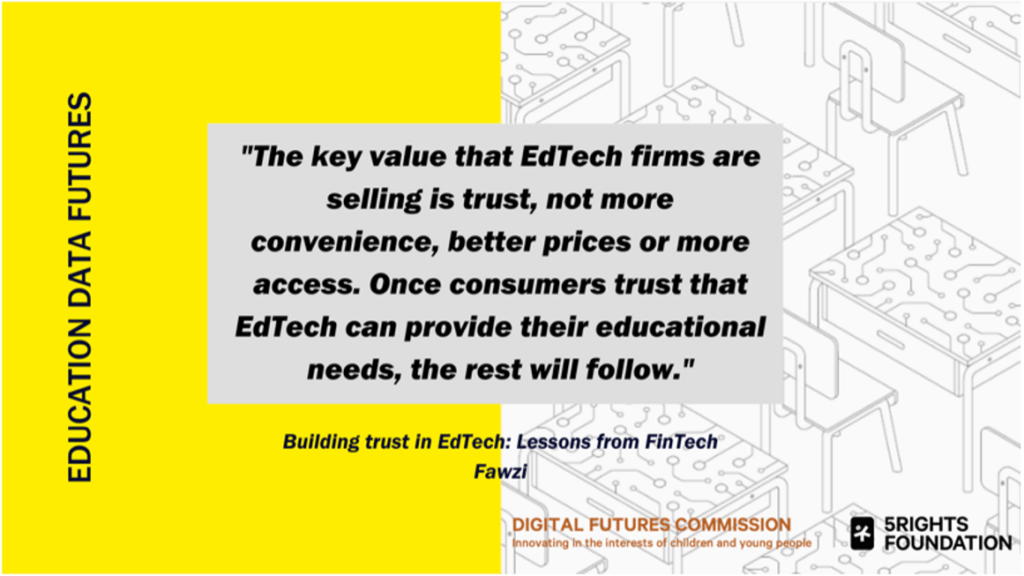The Digital Futures Commission launched its essay collection entitled Education Data Futures: Critical, Regulatory and Practical Reflections on the 21st of November 2022. This essay collection raises critical questions about the interests that the processing of education data really serves, and identifies possibilities for beneficial uses of education data as well as ways to counter exploitative use or misuse of such data. The 20 essays are organised into five sections:
- Competing interests in education data
- The trouble with data
- The value of better regulation
- Seeking design solutions
- Rethinking data futures.
At the launch event, Baroness Beeban Kidron OBE and Professor Sonia Livingstone OBT were joined by DFC researcher, Dr Kruakae Pothong, and some of the essay authors to discuss their contributions:
- Julia Cooke, Information Commissioner’s Office
- Sue Cranmer, Lancaster University
- Riad Fawzi, Second Strand Solutions Ltd
- Andrew McStay, Bangor University
- Jen Persson, Defend Digital Me
- Larissa Pschetz, University of Edinburgh
- Roger Taylor, Open Data Partners
- Ben Williamson, University of Edinburgh
Watch the launch video:
The lively panel discussions surfaced two key requirements for unlocking beneficial uses of education data in children’s best interests:
- Re-balancing in children’s best interests who has the power to manage, share and use data processed from children in education (education data);
- Innovating mechanisms to build trust in both EdTech companies and the wider education data ecology.

The launch included lots of questions in the Q&A that we lacked time to discuss live, so we offer some thoughts here.
Q1: “Do we know how schools are making decisions about EdTech investments, especially if research from outside the EdTech community informs their decisions?”
Our interviews with schools show that schools draw on the experience of other schools concerning the usability and effectiveness of EdTech for teaching and learning. Schools also rely on advice from their Data Protection Officer (DPO) or commercial DPOs for data protection compliance of the EdTech tools they wish to procure. However, our desk research found that the evidence base for EdTech’s value propositions and their capabilities to fulfil the claimed benefits is fragmented and contested, unlike in the healthcare sector where there is a clear set of evidence standards framework for digital technologies to guide healthcare professionals’ procurement decisions. So, to empower schools to make better informed decisions, we need a standardised and comprehensive evidence framework for EdTech.
Q2: “Can we really expect that school leadership would have the skills to negotiate with Big EdTech?”
Our Problems with Data Governance in UK Schools report shows it is unrealistic to expect schools to negotiate terms with major EdTech providers insofar as providers’ privacy policies and legal terms are layered and too complicated for schools to understand or enforce. This undermines the transparency and fairness of education data processing, and thus fails to comply with the UK GDPR and Age Appropriate Design Code. Our interviews with schools and DPOs that found our Education Data Reality report, however, suggested some smaller EdTech providers are working hard to accommodate schools’ requirements.
Q3: “What elements can parents and children realistically negotiate?”
Children and their parents or caregivers have the right to access information held about them under the UK GDPR. Under the Education (Pupil Information) (England) Regulations 2005, parents or those with parental responsibilities also have the right to view the pupil’s education records. Even so, our nationally representative survey with children aged 7 to 16 shows that less than a third of children reported having any discussion with their school about the school’s uses of digital technologies. Fewer pupils still reported being told by their school about how data processed from them were used. Beyond the right to know what data are held, and to correct mistakes, children and parents/caregivers have little power to negotiate with schools, let alone the EdTech providers, over which data are processed from children in practice.

Q4: “Do you think there is an appetite for EdTEch due diligence from the side of “ethical” investors?”
We can see the potential of “ethical investment” in that businesses can be motivated by investors to demonstrate that their design and practices are “ethical” and compliant with relevant regulations and industry standards.
Currently, there is a mix of practices and priorities among investors – profit-driven and ethics-driven. We need more ethics-driven investors to make “ethical investment” a norm in the education sector, and we can look for examples in the financial sector for inspiration.
Q5: “How can it be ensured that the data collected is accurate?”
In educational contexts, people can make mistakes in their manual data input or in their subjective evaluation of children’s behaviour which, in the case of ClassDojo, is entered into the system as if teachers’ subjective evaluations were facts. People can also introduce biases into the design of the algorithms that process data, potentially generating false inferred data about individuals (children) and feeding this back into the education data ecology. The best way to ensure data accuracy is to start with data minimisation, followed by easy and accessible pathways for data subjects to periodically review and correct the data held about them in the same way that we can check or correct our credit rating in the financial sector.
What next?
The Education Data Futures essay collection is another step closer to our final blueprint for regulation to unlock beneficial uses of education data in children’s best interests. We are building on the possibilities for beneficial uses of education data identified in this essay collection and the requirements for effective and practical trust-building mechanisms to address both the power imbalance in EdTech provisions and sub-standard data practices. We will launch this blueprint in the first quarter of 2023.
In the meantime, do follow our blogs and enjoy the resources shared in the chat during the launch event:
- Hendrick, C. (2018). Challenging the ‘Education is Broken’ and Silicon Valley Narratives. ResearchED, 1(1), p. 15. https://researched.org.uk/wp-content/uploads/2020/03/researchEDMagazine-June2018-web.pdf
- Decolonizing Open Science: Southern Interventions https://doi.org/10.1093/joc/jqab027
- Anita Gurunmurthy – IT for change – https://itforchange.net/index.php/
